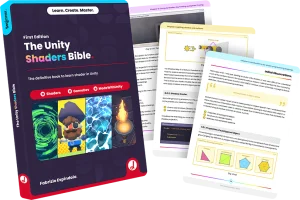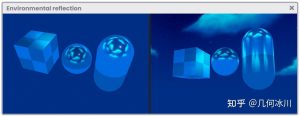目录索引
英文题目:4.0.1. | Analogy between a shader and a material.
如果直接翻译成着色器和材质类比, 就感觉很奇怪, 这俩东西没什么可以类比的… 这一节内容译者看完之后, 感觉是他俩的关系可以用另外两个东西的关系类比一下, 便于我们理解这俩货之间的关系, 最后译者就把小节名字翻译成现在这样了. “好有一比啊~”这个句型经常见于早期的相声.
译文
根据其术语,“材质”定义了表面该如何被渲染,包括对纹理的引用、平铺、偏移、颜色等等。材质的选项(输入参数)取决于正在使用的着色器。
我们把上面的定义用更便于理解的话描述一遍:让我们把材质想象成“着色器的容器”,这意味着我们有用来执行表面计算的程序(着色器)和能够读取这些运算程序的容器(材质)。
因此,材质和着色器,可以比作“图形化的预览(材质)”和“数学计算(shader)”二者的关系。
原文对照
According to its terminology,
“Materials are definitions of how a surface should be rendered, including references to textures, tiling, offset, color and more. The options of a material depend on which shader is being used.“
How can we translate the above definition to a practical level? Let’s think of a material as“the container of a shader”, this means that we have the program that is performing the surface calculations (shader) and the container (material) that is capable of reading these calculations.
A material alone cannot perform any operations. If it doesn’t have a shader it will not know how it should be rendered, likewise, a shader cannot be applied to an object if it is not through a material, therefore, the analogy between a material and a shader is a “graphical preview of mathematical calculations”.

![[udemy]在 Unity 中创建 RPG 游戏的终极指南-软件开发学习笔记](https://gamedevfan.cn/wp-content/uploads/2025/04/TheUltimateGuidetoCreatinganRPGGameinUnity.webp)
![[udemy]学习在 Unity 和 C# 中创建吸血鬼幸存者风格的游戏-软件开发学习笔记](https://gamedevfan.cn/wp-content/uploads/2025/04/LearnToCreateAVampireSurvivorsStyleGameinUnityC.webp)
![[udemy] 在 Godot 4 中创建完整的 2D 幸存者风格游戏-软件开发学习笔记](https://gamedevfan.cn/wp-content/uploads/2025/05/CreateaComplete2DSurvivorsStyleGameinGodot4.webp)
![[gamedev tv] RPG核心战斗力的创造者 :学习中级 Unity C# 编码-软件开发学习笔记](https://gamedevfan.cn/wp-content/uploads/2025/04/RPGCoreCombatCreatorLearnIntermediateUnityCCoding.png)
![[gamedev tv]Unity 2.5D 回合制角色扮演游戏-软件开发学习笔记](https://gamedevfan.cn/wp-content/uploads/2025/05/Unity2.5DTurn-BasedRPG.webp)





暂无评论内容